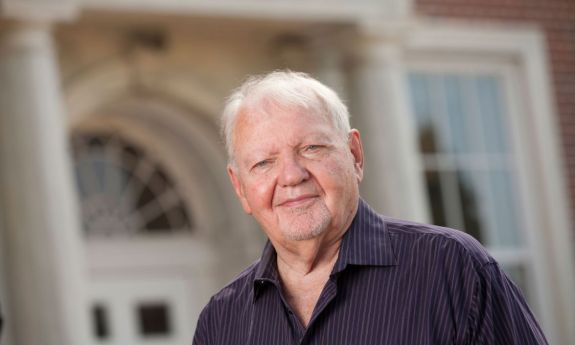[Updated] Memorial Service for Fredric Jameson to Be Held Friday

His 1971 book, "Marxism and Form," helped revitalize Marxist study in literary theory, and his emphasis on the connection between the historical and political encouraged a turn toward political concerns in literary criticism.
Literary scholars from around the world posted tributes Sunday following news of his death. Many of Jameson’s Duke colleagues and former students paid homage to his significance for their work.
“Since his arrival at Duke, Fred Jameson has been the centerpiece in the project that catapulted the humanities at Duke to national leadership,” said Michael Hardt, professor and chair of literature.

Toril Moi, James B. Duke Distinguished Professor of Literature, said Jameson’s death “is an irreparable loss not just to Duke, but to the intellectual world. His work has inspired thousands.”
“In the 1980s, he created the Literature Program at Duke in his image: a broad, welcoming home to faculty and students interested in analyzing and historicizing not just literature, film, and culture, but the world we live in,” Moi said. “The atmosphere of complete intellectual freedom he fostered enabled me to find my own intellectual voice. It’s difficult to fathom that Fred no longer shares our world. But his work will live on.”
Jameson’s legacy extended beyond his books. He attracted graduate students from around the world and advised on an exceptional number of dissertations at Duke. His former students often remained in touch with him after leaving Duke. Many are now leading figures in literary criticism.
Robert T. Tally Jr. ’90, J.D.’01, professor of English at Texas State University, has published extensively on Jameson’s work. Tally recalled: “To me, Fred has always been a teacher, one who is particularly generous, kind, and engaging. His vast and brilliant body of writings exhibits his pedagogical commitments, and even his notoriously complex sentences sound far more fluid when viewed from the perspective of a lecturer. Jameson's example, along with his scholarship, criticism, and theory, has influenced me throughout my career.”
“Fred Jameson was the ultimate mentor in that he opened up every horizon for research, not just for those of us he taught directly, but for anyone who had access to his titanic body of work,” said Jed Esty Ph.D. ’96, Vartan Gregorian Professor of English at the University of Pennsylvania. “He embodied the generosity and expansiveness of his own ideas, paying attention to every new student as he did to every new text and tradition. He kept going and growing because there was always more to learn.”
“One would be hard put to find a humanities scholar who is more widely visible and more frequently cited across the disciplines, and who has sustained national and international critical attention for a more extended period of time than Fred Jameson.”
Rey Chow
Jameson also worked closely with Duke University Press on many projects. His book “Postmodernism, or, The Cultural Logic of Late Capitalism” is the best-selling Duke Press book ever, said Ken Wissoker, senior executive editor. The book has been translated into 13 languages, including Chinese, Montenegrin, Arabic, Korean and Turkish. Jameson also served as editorial board chair of the Duke Press journal South Atlantic Quarterly and served on the Press’ editorial advisory board.
Jameson was still teaching and working on projects at the time of his death. Two new books were published just this spring: “Mimesis, Expression, Construction” (Penguin/Random House), a transcription of a seminar Jameson gave at Duke on Theodore Adorno’s Aesthetic Theory; and “Inventions of a Present: The Novel in its Crisis of Globalization” (Verso Books), which continued Jameson’s exploration of the novel in contemporary culture.
His work brought many awards from leading literature and scholarly groups across the world: In 2012, the Modern Language Association awarded Jameson with its sixth Award for Lifetime Scholarly Achievement. The association also honored “Postmodernism” with the James Russell Lowell Prize in 1990.
"A lifetime achievement award is a little alarming," Jameson told Duke Today at the time. "But on the other hand, it's very nice to have the recognition."
At the time of the award, Rey Chow, then chair of the literature department, said in an interview in 2011, "One would be hard put to find a humanities scholar who is more widely visible and more frequently cited across the disciplines, and who has sustained national and international critical attention for a more extended period of time than Fred Jameson."